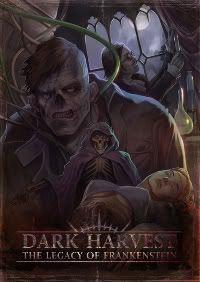First up, thanks for agreeing to be interviewed. You must be an old hand at this sort of thing by now. Do you ever get used to it?
I’ve only done a couple actually, so it’s all still quite shiny and new. I’d love to get to a position where I could go ‘oh, another author interview, what shall I say this time,’ but I’m a long way from that at the moment. Picture me bouncing up and down like an excited five-year-old going ‘someone wants to ask me questions! someone wants to ask me questions!’
Despite having launched right in there, we should probably do some introductions. So, who are you and what do you do?
I’m Kate Harrad. My first novel, All Lies and Jest, was published by Ghostwoods Books last year, and I blog as Fausterella. Which is also the name of my self-published short story collection and of one of the stories in it – a Faust/Cinderella crossover, unsurprisingly. I’ve also published a couple ofgenderswitched stories – classic novels with the genders switched round – which is probably what I’m best known for if I’m known for anything, since I wrote about it for the Guardian.
Mostly, though, I work for the NHS, look after two children, organise parties for my friends, and attempt to keep up with as much pop culture as I can manage.
Your bio on The Guardian’s website makes use of many descriptives, but ‘busy’ certainly applies. How do you structure your time to manage to get in the writing that you do? Obviously you’ve learned to do without sleep.
If only! I managed it last year because my younger daughter was still a baby and slept a lot. Now she’s turned two and all of my writing time has disappeared. I need to go back to writing on my phone during my commute to and from work. Or train her up as my secretary, but so far her typing mostly looks like GGGGGGGGGHHHHHHHHHHHHHRRRRRRRRRRRRRRRIIIIIIIIIII, which may only be meaningful to other two-year-olds.
Tease us! What’s your story in the anthology?
It’s about a sacrificial cult who worship Frankenstein, and who donate body parts to the aristocracy as part of their religion. And about the way the village around them reacts to that, and about the moral qualms of the doctor who performs the operations. So it’s quite dark. Well, I thought it was quite dark before I read some of the other stories…
DH:LoF is, amongst many things, an RPG. Are you, or have you ever been, a gamer of any sorts? Is that something else you cram into your terrifying schedule?
I used to be an occasional gamer, yes – a couple of my friends write RPGs, so the ones I’ve played have been written and GMed by them. I enjoy it but I’m terrible at it: the last game I played, I got killed by a vampire right at the end after completing the quest, because I invited her into my room and gave her a hug. I will never live that down. But when I have time (hmm) I’d love to get back into it, and possibly get killed less.
When did Promethea appear on your radar? How did the invite to participate in the anthology come about?
Tim Dedopulus, my publisher, is also a games writer and has been recommending me to people, which is much appreciated. So I’ve ended up meeting (on or offline) people like James Wallis, Greg Stolze and you, and various co-writing plans have been hatched, though some are on hiatus while we all try to find time for them. I’m very pleased to have been invited to write for Dark Harvest and would love to write more RPG fiction – the experience of writing within an existing universe is new to me and has been enormous fun.
It’s all very well being invited to contribute to one of these anthology things, but quite another to actually participate. What was it in the DH:LoF setting that drew you in? Where did the story first come from?
When I read up on the Promethean universe I knew it had to contain people who actively embraced the masochistic aspect of the dark harvest. And it fitted in with my own preoccupations with strange cults and twisted religion (which is what my novel’s about, too). I was an evangelical Christian as a teenager and now I’m an atheist, and there’s a bit of my brain that’s very obsessed with all that. I liked the idea of taking the already disturbing concept of the bodies of peasants being used for the benefit of the upper class, and giving it one more twist to make it a voluntary act.
What’s your writing process? Are you terribly spontaneous, or frighteningly structured, or are you… Oooh! Shiny thing!!
If I write too much structure in advance, I find it difficult to write the story. So I try to do it all in a few bursts – gather all the context and the characters and the general story in my head, mix it all together, and hope it rises in the, er, oven of my brain. If I wait too long to write it down, it tends to deflate.
What are you working on at the moment?
I’m trying to write a second novel, but it might have to wait till my daughter’s in school. Other than that, short stories as and when. I recently had a story in Glitterwolf magazine, about a society where people have started transforming themselves into pure narrative. And I have two stories in Salome Jones’s upcoming book Red Phone Box, which is a novel/short story collection including one by Warren Ellis. There’ll be aKickstarter for that coming in January.
If you could point to one other thing you’ve done to date as a particularly fine example of what you do, what would it be?
I’m very fond of my play, Looking Busy, which is about a group of people who know the world is ending and that only two of them will be saved. The first half is them trying to deal with that, and the second half is set after the end of the world, with a power struggle between the human survivors and God and the angels. It’s a comedy. Sadly I can’t literally point anyone to it as it’s not published anywhere, but if anyone would like a funny full-length play with five characters, do let me know.
Other than that, my novel All Lies and Jest is my best example. It’s set in a slightly-speculative London where the US style of evangelism has taken over – it was a lot more speculative when I originally wrote it but now the real world has practically caught up, which is disturbing. Anyway, it’s got a vampire church in it, and kinky Christians, and an end-of-the-world cult, and a were-mosquito. And a narrator who wants to save the world. It’s a sort of comic speculative dystopian thriller – I’ve never been sure about its genre.
It’s Christmas? What have you got planned?
Mainly I have a lot of present-wrapping planned. Then, should I ever get that finished, we’re off to my parents to be pampered for a couple of days. There may be Scrabble.
Many thanks for the interview! What are you off to do now?
Well, tonight I’m off to see a gig by occult goth transvestite comic Andrew O’Neill, who I recently discovered when I saw his steampunk band The Men Who Will Not Be Blamed For Nothing. Can’t wait.
More info on Kate and her work can be found at http://loveandzombies.co.uk/
The Cult of Victor
‘Tell us how it began.’
‘It began with a pair of hands.’
###
Dr Grasu no longer bothered to examine the pieces of paper handed to him by Lady Iulia’s manservant. They were all perfectly legitimate, so far as they went. That is, they had been signed by the correct number of the correct officials, and they certified that Lady Iulia was suffering from skin problems, or eyesight problems, or a broken ankle – something to which the cure lay in the skin, eyes, ankles and so on of another person.
Augmentation was Lady Iulia’s hobby, obsession and religion. She had the connections to keep it up, and the more Augmented she became, the better her connections got. Her multiple scars and grafts were always in fashion. There was a rumour she aspired to win the hand of Frankenstein himself, although nobody was sure if scars were actually the way to the King’s heart. Certainly, the doctor reflected, he seemed to have resisted Iulia’s largely borrowed charms so far.
‘Dr Grasu?’ asked the aristocrat, impatient. ‘Do you understand what I need?’
‘Your hands are leprous,’ said the doctor, finally glancing at the paper. He kept his voice neutral. It was possible that the words were edged with a hint of scepticism, but Iulia showed no awareness of it.
‘Possibly leprous,’ she conceded. ‘Best to replace them before the worst happens, though, don’t you think?’ ‘Of course, my lady. Give me a day or two to find a donor-’
‘Actually,’ she interrupted, ‘I may have someone.’
The doctor nodded, resigned. She always did. Did she keep a collection of peasants in her cellars like wine bottles, waiting for the right occasion? He half-believed that she did, although he had no intention of investigating. His job was to perform the surgery, take the fee, and keep quiet. You didn’t want to alienate your best customer.
Nevertheless, as he stood in his office listening to the dwindling rush of his best customer’s skirts, he couldn’t stop himself from wondering. Where did she get her harvest?
###
The village of Sângeorgiu de Mureş lay on the outskirts of Târgu Mureș, the new capital of Promethea. To be so near Frankenstein’s home was a blessed location, but also a dangerous one – the flame that lit the country both warmed and burned them. On one hand, because of the regular visits of foreign dignitaries to the city, the DSF ensured that the villagers living on the outskirts were always presentable. Never obviously starving, and always engaged in productive work. That was a good thing. On the other hand, freedom was even more limited than in most of the country. There could be no hint of resistance, let alone the Resistance.
It was for this reason that the parish priest had been discharged from his duties some years ago, since everyone knew the Orthodox Church was sympathetic to the struggle, and since then the village church had fallen, heavily, into disuse. Only the graveyard was operational. The main building had become a ruin remarkably quickly, as though God had known there was nothing for Him there any more.
But when God and the villagers had abandoned the church, they had created a vacuum. That vacuum was now being filled, very furtively and unobtrusively, by another religion. A much smaller one and a much newer one.
‘I think they are meeting again tonight,’ said Elena Cristescu to her husband, quietly, as they lay in bed.




Pingback: Tales of Promethea – Interviews, Excerpts, and a Download! | Dark Harvest